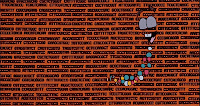Halloween is so weird this year. One, because we’re all just exhausted from a year of isolation and stress and way too much death. I really hope none of that death has touched you and yours, but we’re kinda at the point where odds are it probably has. And if that’s the case, I’m so very sorry.
Actually, that’s what I wanted to talk about.
There’s a certain type of character who shows up a lot in horror, and for lack of a better term, we’ll call them the Idiot. They’re the one who simply refuses to believe zombies are real, even when three people have been killed. They’re convinced the aliens are benevolent and this is just a communications problem that can be worked out. Or maybe they’re convinced *cough*cough* the deadly virus is nothing to worry about. Probably one of the most famous Idiots is Mayor Vaughn from Jaws. On the off chance you haven’t seen the movie—and seriously, what the hell is wrong with you if that’s the case—when a great white shark appears off the coast of his small New England resort town, Vaughn ignores all the warnings he gets from the local police chief and a visiting scientist, refusing to close the beaches.As you may have heard, this does not work out all that great for him. Or some of his constituents.
It’s worth pointing out most of the time the Idiot isn’t actually ignorant. They’re making a deliberate decision to ignore all this evidence they’ve been given. Maybe it’s because it goes against too many things they believe. Maybe their motivation’s more financial. Maybe it’s about power. But it’s almost always a decision made for personal reasons, not because of lack of actual information.
There’s a reason for that, and it’s one of the reasons these characters sometimes fumble. If someone comes running up to me and says there’s a zombie horde around the corner, I’m going to assume they’re either under the influence or maybe a bit unbalanced. Because zombies don’t exist. Me thinking they don’t exist is completely rational. If a storyteller tries to paint someone like me, in a real-world setting, as the Idiot... it’s not going to work that great.
But...
If there’ve been reports of zombie attacks for weeks, and I saw a zombie take down a guy in the Target parking lot two days ago, and now someone runs up and says there’s a zombie horde around the corner... Okay, now I’m in a bit of denial if I mock them. Because I’ve seen evidence of this already. Lots of evidence.
When an Idiot character doesn’t work, I think a lot of times it’s because of where they’re appearing in the story. There’s only a small window where this character really shines. Too soon in the chain of events, and—as I mentioned above—it makes sense I’m not going to believe in zombies. So being the Idiot early on doesn’t work.
On the flipside, if we’re two years into the zombie post-apocalypse, it’s kind of tough for readers to believe someone could still be in denial. Heck, how could they have survived this long? There’s a point where we’ve moved past “denial” and we need to be asking about head trauma and medications.Y’see, Timmy, the Idiot only really works in that one sweet spot of the greater, overall story. After things could be rationally excused or ignored, but before things are, y’know, in flames. If I try to have this character outside that range, it’s going to be really tough to make it work.
Also worth noting the Idiot tends to be an authority figure. Not always, but I’d guess it’s more often than not. Police chief, military general, senior scientist, politician—these are all common Idiots (no pun intended). From a narrative point of view, this gives their decisions (or lack of decisions) more weight. A waiter deciding he’s going to ignore the CDC zombie guidelines when he makes decisions doesn’t have as much impact as, say, a governor or a senator who thinks they can be ignored.
Now, granted, there are times I’ll have a character in my story who’s just... an idiot (garden-variety, small “i”). There’s always going to be that person who firmly believes zombie vision is based on movement, who crouches down to pat the alien space cobra, or who thinks wearing a protective mask is more likely to get them sick than not wearing one. That’s just kind of the way people are in any society that’s taken off some Darwinian pressure. Some folks are just stupid and they do stupid things.
And while having this kind of annoying character can serve a purpose in the story, we shouldn’t get them confused with that deliberate, capital-letter type. An Idiot can stick around in my story for a while, but an actual idiot... well, readers generally don’t have the patience for them. Not to point fingers, but think how fast most Vince Vaughn characters get annoying. We don’t have patience for idiot (small i) characters because the nature of the story asks us to identify with characters. And really, why would anyone want to identify with an idiot?
But the Idiot... we may not like or agree with their motivations, but we can understand them. Mayor Vaughn in Jaws knows there’s a shark out there. He also knows shutting down the beaches could ruin his small town and it’ll definitely ruin him come the next election. So... he makes a stupid decision. A similar thing happens in my own book, Dead Moon, withDo you have an Idiot in your story? Do they exist in that sweet spot? Or are they at a point where their stubborn denial is just coming across as unbelievable?
Next time... look, you’re telling me too much. Please stop. I don't want to hear this. TMI.
Until then, go write.














